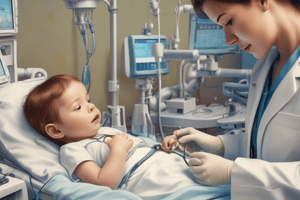Podcast
Questions and Answers
What is the primary anesthetic technique recommended for neonatal circumcision?
What is the primary anesthetic technique recommended for neonatal circumcision?
- General anesthesia
- Inhalation anesthetic
- Topical local anesthetic
- Subcutaneous ring block with NO EPI (correct)
What is a potential risk when using a bougie during Nissen Fundoplication?
What is a potential risk when using a bougie during Nissen Fundoplication?
- Respiratory distress
- Dysphagia
- Hemorrhage
- Esophageal perforation (correct)
Which type of esophoria involves one eye being pointed outward?
Which type of esophoria involves one eye being pointed outward?
- Esotropia
- Exophoria (correct)
- Hypophoria
- Hyperopia
What is the primary treatment for postoperative nausea and vomiting (PONV) following strabismus surgery?
What is the primary treatment for postoperative nausea and vomiting (PONV) following strabismus surgery?
What is the correct order of monitoring requirements during pediatric anesthesia induction?
What is the correct order of monitoring requirements during pediatric anesthesia induction?
What is the most important consideration regarding premedication in pediatric patients?
What is the most important consideration regarding premedication in pediatric patients?
What is a recommended dosage of succinylcholine for pediatric patients when administered IV?
What is a recommended dosage of succinylcholine for pediatric patients when administered IV?
What is a common symptom of a kinked endotracheal tube (ETT)?
What is a common symptom of a kinked endotracheal tube (ETT)?
In pediatric patients, why might desflurane be preferred over other anesthetics?
In pediatric patients, why might desflurane be preferred over other anesthetics?
What should be done first if a patient starts bucking during ventilation?
What should be done first if a patient starts bucking during ventilation?
What condition is associated with pyloric stenosis in infants?
What condition is associated with pyloric stenosis in infants?
What is a significant preoperative consideration for a patient receiving a Broviac line?
What is a significant preoperative consideration for a patient receiving a Broviac line?
What might be a consequence of preoperative alkalosis in patients undergoing pyloromyotomy?
What might be a consequence of preoperative alkalosis in patients undergoing pyloromyotomy?
What is true regarding the emergence delirium associated with sevoflurane?
What is true regarding the emergence delirium associated with sevoflurane?
In patients with pyloric stenosis, what is a common abdominal finding?
In patients with pyloric stenosis, what is a common abdominal finding?
Match the NPO guidelines with their respective timeframes:
Match the NPO guidelines with their respective timeframes:
Match the following emergency medications with their appropriate dosages:
Match the following emergency medications with their appropriate dosages:
What is the recommended concentration of N2O and O2 for inhalation induction in pediatric patients?
What is the recommended concentration of N2O and O2 for inhalation induction in pediatric patients?
Which of the following emergency medications should be readily available? (Select all that apply)
Which of the following emergency medications should be readily available? (Select all that apply)
What is the benefit of spontaneous ventilation during inhalation induction?
What is the benefit of spontaneous ventilation during inhalation induction?
What are common causes of bronchospasm? (Select all that apply)
What are common causes of bronchospasm? (Select all that apply)
What would you observe on the ventilator if your patient is experiencing bronchospasm? Select all that apply.
What would you observe on the ventilator if your patient is experiencing bronchospasm? Select all that apply.
Which regional block is commonly used in umbilical hernia repairs?
Which regional block is commonly used in umbilical hernia repairs?
What are common causes of laryngospasm? (Select all that apply)
What are common causes of laryngospasm? (Select all that apply)
What is the maximum positive pressure that can be used in managing a laryngospasm in a pediatric patient?
What is the maximum positive pressure that can be used in managing a laryngospasm in a pediatric patient?
Which of the following medications is commonly used to treat emergence delirium? select 3
Which of the following medications is commonly used to treat emergence delirium? select 3
What is the proper technique to use during extubation?
What is the proper technique to use during extubation?
What are signs of resolution of stage 2 of anesthesia? (Select all that apply)
What are signs of resolution of stage 2 of anesthesia? (Select all that apply)
What is the purpose of the BMT (bilateral myringotomy with tubes) procedure?
What is the purpose of the BMT (bilateral myringotomy with tubes) procedure?
What anesthesia care is typically performed for BMT?
What anesthesia care is typically performed for BMT?
What are the positioning considerations for tonsillectomy and adenoidectomy (T&A)?
What are the positioning considerations for tonsillectomy and adenoidectomy (T&A)?
What are the maintenance considerations for a tonsillectomy and adenoidectomy (T&A)?
What are the maintenance considerations for a tonsillectomy and adenoidectomy (T&A)?
What are the extubation considerations for a tonsillectomy and adenoidectomy (T&A)?
What are the extubation considerations for a tonsillectomy and adenoidectomy (T&A)?
What is the risk of rebleeding within 6 hours postoperatively after a tonsillectomy and adenoidectomy (T&A)?
What is the risk of rebleeding within 6 hours postoperatively after a tonsillectomy and adenoidectomy (T&A)?
What is the risk of rebleeding after a tonsillectomy and adenoidectomy (T&A) in the first 24 hours?
What is the risk of rebleeding after a tonsillectomy and adenoidectomy (T&A) in the first 24 hours?
What needs to be established prior to induction in an emergency cauterization of the tonsils?
What needs to be established prior to induction in an emergency cauterization of the tonsils?
What block and position are used in an inguinal hernia repair?
What block and position are used in an inguinal hernia repair?
What condition is a medical emergency that requires surgical intervention to treat due to electrolyte imbalances?
What condition is a medical emergency that requires surgical intervention to treat due to electrolyte imbalances?
What is the typical patient who requires Pyloromyotomy?
What is the typical patient who requires Pyloromyotomy?
Pyloric stenosis occurs more in boys than girls
Pyloric stenosis occurs more in boys than girls
What are the anesthetic considerations for a pyloromyotomy? (Select all that apply)
What are the anesthetic considerations for a pyloromyotomy? (Select all that apply)
Why does the room need to be warm when providing care for a patient with sickle cell disease?
Why does the room need to be warm when providing care for a patient with sickle cell disease?
What should be performed for a patient with sickle cell disease prior to induction?
What should be performed for a patient with sickle cell disease prior to induction?
What is acute chest syndrome?
What is acute chest syndrome?
How should you intubate a patient during a Nissen fundoplication procedure?
How should you intubate a patient during a Nissen fundoplication procedure?
What is the oculocardiac/5 and dime/trigeminovagal reflex?
What is the oculocardiac/5 and dime/trigeminovagal reflex?
Flashcards
Nissen Fundoplication
Nissen Fundoplication
A surgical procedure used to treat GERD by wrapping the fundus of the stomach around the lower esophagus to reinforce it.
Strabismus
Strabismus
A condition where one eye deviates from the normal visual axis of the other eye.
Circumcision
Circumcision
Surgical removal of the foreskin of the penis.
Complications of Circumcision
Complications of Circumcision
Signup and view all the flashcards
Oculocardiac reflex
Oculocardiac reflex
Signup and view all the flashcards
Pediatric Anesthesia Standard Monitors
Pediatric Anesthesia Standard Monitors
Signup and view all the flashcards
Calculating Average Pediatric Weight
Calculating Average Pediatric Weight
Signup and view all the flashcards
Preoperative IV Fluids
Preoperative IV Fluids
Signup and view all the flashcards
Preoperative Evaluation for Anesthesia
Preoperative Evaluation for Anesthesia
Signup and view all the flashcards
NPO Guidelines for Pediatrics
NPO Guidelines for Pediatrics
Signup and view all the flashcards
Kinked ETT
Kinked ETT
Signup and view all the flashcards
Kinked ETT treatment
Kinked ETT treatment
Signup and view all the flashcards
Pyloromyotomy
Pyloromyotomy
Signup and view all the flashcards
Pyloromyotomy anesthetic implications
Pyloromyotomy anesthetic implications
Signup and view all the flashcards
ROP Risk
ROP Risk
Signup and view all the flashcards
Pyloromyotomy patient
Pyloromyotomy patient
Signup and view all the flashcards
Broviac
Broviac
Signup and view all the flashcards
Broviac Maintenance
Broviac Maintenance
Signup and view all the flashcards
Sickle Cell Broviac concerns
Sickle Cell Broviac concerns
Signup and view all the flashcards
Pediatric Sevo Concerns
Pediatric Sevo Concerns
Signup and view all the flashcards
Study Notes
Pediatric Anesthesia
- Precordial stethoscope and SPO2 are required for induction
- EKG and NIBP can wait until after induction
- Appropriate sized ambu bag and circuit
- IV kit = 20, 22, 24 angiocaths
- IV fluids = 4/2/1
- Preop IV = Mr. Freeze, EMLA kit
- Average weight in kg = age in years x 2 + 10 = 90th percentile
- Emergency medications: atropine (0.2 mg/kg), succinylcholine (2 mg/kg IV; 4 mg/kg IM), epi (10mcg/kg)
- Preop evaluation: length of pregnancy, hx of IVH/assisted ventilation, family hx of anesthesia problems, sickle cell or trait, GERD, recent colds/URI
- NPO guidelines: clear liquid 2 hours, breast milk 4 hours, formula 6 hours, solids 8 hours
- Premedication: Can make emergence slow. IM, IN, PO ketamine, fentanyl, versed
- Induction: Inhalation (N2O 70%, O2 30%), consider stun dose prior to sevo, IV or combined
- Benefit of spontaneous ventilation on inhalation agent = autoregulation
- Too deep - pt will breathe slower and take in less volatile
- Too light - pt will breathe quicker and take in more volatile.
- Bronchospasm causes = RAD, mainstem ETT, mechanical obstruction (e.g., kinked ETT)
Pediatric Emergencies
- Symptoms of difficulty or inability to ventilate include high peak pressures, desaturation, and low or no ETCO2, no breath sounds, and minimal chest rise.
- Treatments include 100% FiO2, deepening anesthetic, beta agonists, epi, terbutaline, ketamine, aminophylline, lidocaine, corticosteroid.
- Risks of Emergence delirium.
- Risk of induction with sevo but consider changing to another volatile, desflurane tends to keep HR higher - good in kids because CO depends on HR
Pediatric Regional Techniques
- Caudal
- TAPS common for umbilical hernia repairs
- Maintenance fluid in 4/2/1
- 10 kg child with minimal insensible fluid losses= 40, 40, and 40
Pediatric Stimulation/Extubation
- Consider SIMV mode
- Ensure pt is out of stage 2
- Suction
- Pull ETT with positive pressure
- Immediately apply mask with positive pressure and jaw thrust until adequate respiration is noted
- Deep extubation: suction, consider oral airway, pull ETT and provide jaw thrust with positive pressure, turn off gas and support the airway, signs of stage 2(thrashing, red sclera, dysconjugate gaze)
- Resolution of stage 2 ( return of normal gaze), white sclera, gumming ETT
- Swallowing (grimace, tear formation)
- Laryngospasm - forceful involuntary spasm of the laryngeal musculature. Cause by upper airway restriction, secretions or light anesthesia. Solutions: 100% FiO2, positive pressure (<20 cmH2O), jaw thrust, succinylcholine
- Post-extubation stridor, Causes = high cuff pressures, airway swelling, ETT movement in trachea, treatment = humidified O2, steroids, racemic epi.
Common Pediatric Surgeries
- Rules for pediatric surgery: preparation, open communication, teamwork, backup
- BMT = bilateral myringotomy with tubes
- Tonsillectomy and adenoidectomy (T&A).
- Excision of palatine tonsils and adenoids.
- Position supine with arms at sides and bed turned 90 degrees
- Used with oral RAE tube.
- Maintainence: low O2, IVF, antiemetics, empty stomach
- Transport pts to PACU in lateral position with blow by oxygen, If re-bleeding happens, consider the patient a full stomach.
- Inguinal hernia repair, position supine, arms at sides, caudal block.
- Umbilical hernia repair (Population >3 YO), TAPS block
- Pyloromyotomy
Other Pediatric Considerations
- Hypertrophy of muscle fibers of the pyloric sphincter can cause gastric outlet obstruction (olive-shaped mass).
- Not a surgical emergency, but medical, requiring fluid and electrolyte balance correction.
- Dehydrated hyperchloremic metabolic alkalosis from vomiting
- Compensatory hypoventilation to increase CO2
- High pH suppresses the central respiratory centers leading to inappropriate respiratory response
- Patient population = usually several weeks old
- Positioning: supine, pt may be turned 90 degrees away.
- Broviac/Mediport = Frequent or long term IV access, done with fluoroscopy, similar to central line placement.
- Maintenance: Not very painful so ½ dose of narcotic is usually sufficient, ectopy while threading the catheter
- Special considerations: sickle cell (need warm room, cold causes sickling), cancer (family interaction, immunocompromised), adjuncts/procedures (bone marrow biopsy, LP)
Other Procedures
- Circumcision: Usually done a day or two after birth. Simplest anesthetic technique is the subcutaneous ring block (using LA with NO EPI) at the base of the penis, no epi in LA used for fingers, toes, or nose
- Complications include hematoma and penis ischemia
- Nissen Fundoplication, Used to treat GERD. Fundus of stomach is wrapped around lower esophagus, laparoscopic vs open.Caution with bougie due to esophageal perforation risk
- Strabismus/Esophoria/Exophoria (eye deviation), Esotropia (inward eye deviation of both eyes), high incidence of PONV so treat with IVF or Zofran, Oculocardiac reflex, trigeminovagal reflex= bradycardia with pressure applied to eye
Studying That Suits You
Use AI to generate personalized quizzes and flashcards to suit your learning preferences.




